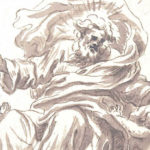We run our website the way we wished the whole internet worked: we provide high quality original content with no ads. We are funded solely by your direct support. Please consider supporting this project.

God Became What He is Not To Reveal What He Is
We are saved because Jesus became the curse of the law for us (Gal. 3:13). So too, the way Christ freed us from the condemnation of sin and enabled us to “become the righteousness of God” was by becoming sin for us (2 Cor. 5:21). What is more, since the curse of the law includes enslavement to “the elemental spiritual forces of this world” (Col. 2:20), we may add that the way Christ freed us from the fallen powers was by voluntarily identifying with our enslavement to the powers. This self-sacrificial act “canceled the charge of our legal indebtedness which stood against us and condemned us,” for by this means God “disarmed the powers and authorities” and “made a public spectacle of them, triumphing over them on the cross” (Col. 2:14-15; 1 Cor. 2:8; 1 Jn.3:8).
We understand God’s nature as God reveals the perfect love that he eternally is by humbly condescending in his relationship with us. God’s love was most definitively revealed in his greatest condescension, which occurred on Calvary when God stooped to become what is antithetical to himself —viz. our sin and our curse. In addition, God’s triune unity was most perfectly revealed when Jesus, out of love for humankind, experienced God-forsakenness on the cross, for God’s unity is other-oriented love, and for the Son of God to experience God-forsakenness on behalf of fallen humanity is its supreme expression. We could sum this point up by saying that the greatest act of God’s condescension, and therefore the act that constitutes his fullest self-revelation, took place when God humbly and self-sacrificially entered into self-negation.
By combining this point about God’s nature with the teachings on how Jesus saved us, we can see that the loving self-negation that was God’s supreme self-revelation was also the means by which God freed us from the curse of the law and rescued us from the oppression of Satan and the fallen powers. This is no coincidence, I contend, for revelation and salvation are inextricably bound up with one another. God saves us by revealing his true self to us, and he reveals his true self to us by saving us. And both are accomplished by God stooping to take on the “strange” and ‘alien” semblance of a God forsaken, law-cursed, criminal on Calvary. In other words, God’s supreme revelation as well as our salvation both take place by means of God’s loving self-negation.
This strong correlation between revelation and salvation should not surprise us, for going back to the garden when humanity first fell, our alienation from God and bondage to Satan has been most fundamentally rooted in the false picture of God the serpent tempted us with (Gen. 3). We are alienated from God primarily because we are deceived about God’s perfect character and thus cannot trust him and walk trustworthy before him. This is why it is no coincidence that the one who finally reveals what God is really like is also the one who saves us from our bondage to the powers. The “Word” is the” Savior,” and he’s the one precisely because he’s the other, and both roles culminated when God experienced other-oriented self-negation, becoming our sin, our curse and our bondage on Calvary.
On the cross we find God becoming what is “strange” and “alien” and even antithetical to himself as a means of simultaneously revealing who he truly is. And by revealing who he truly is by means of the cross—becoming what he is not—the love of God defeated Satan and the powers and freed us from the curse of needing to live under the portrait of God as a law-oriented deity. Moreover, inasmuch as the law of the OT is bound up with its nationalism and violence, we can say that, by means of this cruciform negative pedagogy, God also freed us from the curse of living under the portrait of God as a violent, nation-centered warrior.
Hence, we may conclude that, in Christ, the God who previously stooped to bear the sin of guilty people by taking on the semblance of a law-oriented, nationalistic, violent warrior, now stooped even further to bear the sin of guilty people by becoming a crucified criminal who appeared cursed by this law-oriented warrior. And by means of this contrast, God definitively revealed that his true nature is not that of a law-oriented, nationalistic, warrior: it is, rather, that of an enemy-loving, non-violent, Savior. Just as the law and the curse were abolished when Christ was crucified (Col. 2:14-15), so we may say that, the portrait of God as a violent warrior was forever abolished when Christ was crucified. Hence, on Calvary we find the self-sacrificial crucifixion of the God who previously condescended to wear the mask of a warrior god as well as the crucifixion of the mask of the warrior god he previously condescended to wear.
Image by Greg Rakozy.
Category: General
Tags: Cruciform Theology, God, Salvation
Topics: Attributes and Character
Related Reading

Why God Sometimes “Can’t”
Greg continues his thoughts on sickness and spiritual warfare by addressing the question of why God “can’t” intervene in some circumstances of illness.

Podcast: If the Biblical Prophecies are Flawed, Aren’t Those Prophets ALL False Prophets?
If you want to hear Greg sweat, listen to him work through this really really good question. http://traffic.libsyn.com/askgregboyd/Episode_0200.mp3 Photo by Rex Boggs

God’s Love is Cruciform
Paul instructs us in what it means to follow Jesus, when he stated, “Follow God’s example, therefore, as dearly loved children and walk in the way of love, just as Christ loved us and gave himself up for us as a fragrant offering and sacrifice to God (Eph 5:1-2). Here Paul defines what it means to…

A Coming Storm
There is a storm beginning to brew on the horizon. It is a debate among Evangelicals about the violent depictions of God, stirred up largely by Eric Seibert’s Disturbing Divine Behavior. Here is a post that sounds “the clarion call.” The debate is presently around two options. Option #1: Traditionalists argue we must simply embrace…

Making God in Our Own Image
In this video, Greg introduces the idea of how we make God into our own image instead of allowing God to define himself through the revelation of Jesus. In an interview performed by Travis Reed from theworkofthepeople.com, we have a basic, quick introduction to a core element of Greg’s theology. This is a great piece to…

Podcast: Isn’t God Withdrawing the SAME as Him Personally Punishing and Causing Violence?
Greg discusses whether the passivity of withdrawal is distinguishable from active punishment. http://traffic.libsyn.com/askgregboyd/Episode_0186.mp3
